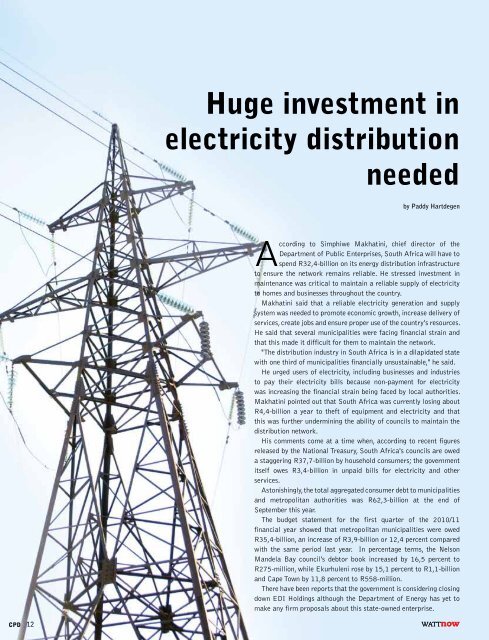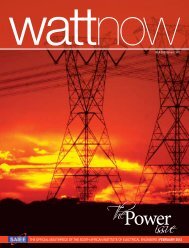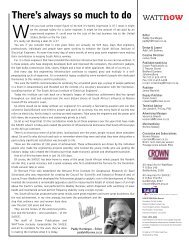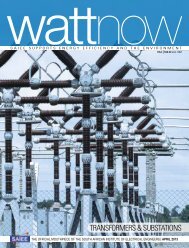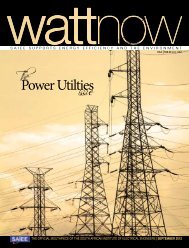download a PDF of the full November 2010 issue - Wattnow
download a PDF of the full November 2010 issue - Wattnow
download a PDF of the full November 2010 issue - Wattnow
Create successful ePaper yourself
Turn your PDF publications into a flip-book with our unique Google optimized e-Paper software.
Huge investment in<br />
electricity distribution<br />
needed<br />
by Paddy Hartdegen<br />
According to Simphiwe Makhatini, chief director <strong>of</strong> <strong>the</strong><br />
Department <strong>of</strong> Public Enterprises, South Africa will have to<br />
spend R32,4-billion on its energy distribution infrastructure<br />
to ensure <strong>the</strong> network remains reliable. He stressed investment in<br />
maintenance was critical to maintain a reliable supply <strong>of</strong> electricity<br />
to homes and businesses throughout <strong>the</strong> country.<br />
Makhatini said that a reliable electricity generation and supply<br />
system was needed to promote economic growth, increase delivery <strong>of</strong><br />
services, create jobs and ensure proper use <strong>of</strong> <strong>the</strong> country's resources.<br />
He said that several municipalities were facing financial strain and<br />
that this made it difficult for <strong>the</strong>m to maintain <strong>the</strong> network.<br />
"The distribution industry in South Africa is in a dilapidated state<br />
with one third <strong>of</strong> municipalities financially unsustainable," he said.<br />
He urged users <strong>of</strong> electricity, including businesses and industries<br />
to pay <strong>the</strong>ir electricity bills because non-payment for electricity<br />
was increasing <strong>the</strong> financial strain being faced by local authorities.<br />
Makhatini pointed out that South Africa was currently losing about<br />
R4,4-billion a year to <strong>the</strong>ft <strong>of</strong> equipment and electricity and that<br />
this was fur<strong>the</strong>r undermining <strong>the</strong> ability <strong>of</strong> councils to maintain <strong>the</strong><br />
distribution network.<br />
His comments come at a time when, according to recent figures<br />
released by <strong>the</strong> National Treasury, South Africa's councils are owed<br />
a staggering R37,7-billion by household consumers; <strong>the</strong> government<br />
itself owes R3,4-billion in unpaid bills for electricity and o<strong>the</strong>r<br />
services.<br />
Astonishingly, <strong>the</strong> total aggregated consumer debt to municipalities<br />
and metropolitan authorities was R62,3-billion at <strong>the</strong> end <strong>of</strong><br />
September this year.<br />
The budget statement for <strong>the</strong> first quarter <strong>of</strong> <strong>the</strong> <strong>2010</strong>/11<br />
financial year showed that metropolitan municipalities were owed<br />
R35,4-billion, an increase <strong>of</strong> R3,9-billion or 12,4 percent compared<br />
with <strong>the</strong> same period last year. In percentage terms, <strong>the</strong> Nelson<br />
Mandela Bay council's debtor book increased by 16,5 percent to<br />
R275-million, while Ekurhuleni rose by 15,1 percent to R1,1-billion<br />
and Cape Town by 11,8 percent to R558-million.<br />
There have been reports that <strong>the</strong> government is considering closing<br />
down EDI Holdings although <strong>the</strong> Department <strong>of</strong> Energy has yet to<br />
make any firm proposals about this state-owned enterprise.<br />
12


